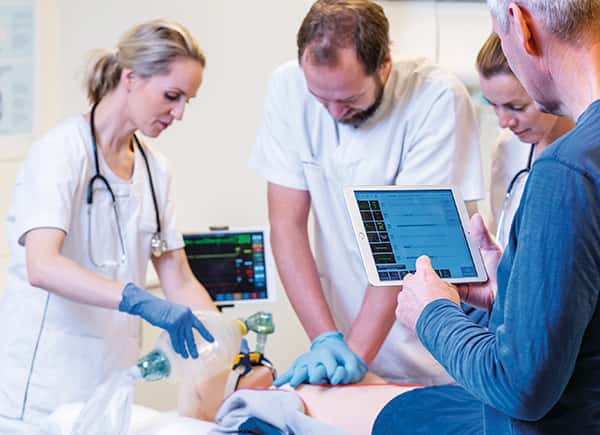How to deliver a high impact remote learning experience
Customer story



Jared M. Kutzin, DNP, MS, MPH, RN, FSSH
Associate Professor, Emergency Medicine and Medical Education
When the COVID-19 pandemic hit, many needed to transition quickly from in-person teaching to virtual learning. For example, initial ad hoc training involved creating PowerPoint presentations to try to explain the functionality of the ventilators, but using static images and screen captures to explain waveforms and volume was not ideal for learning.
There was a need to provide learners in the Department of Emergency medicine -- from emergency medicine residents and medical students to emergency nurses and physician assistants with effective remote learning.
How could we ensure the education provided to students remotely was as good as to students who had participated previously in person?
The goal was to find a solution to allow learners to be engaged in their learning experience as active participants rather than passive viewers.
The TruMonitor program was used to run virtual cases and vital signs displayed on the screen changed in real-time. Learners were able to interact with an individual playing the role of the nurse and determine which buttons to push on the defibrillator enabling them to have a more engaging experience. All the parameters could be seen on the screen and manipulated.
By incorporating TruMonitor with low tech manikins, an additional level of fidelity was able to be achieved. It enabled insights to simulations without requiring additional equipment. The wireless features enabled instructors and learners to screen share.
With the remote learning component, instructors are able to share the monitor with students around the world in real-time. For example, when an instructor is providing a lesson via Zoom, they are able to screen share the TruMonitor app and run it from a tablet or a mobile phone for a convenient and seamless experience. It was also useful for running in-situ simulations as well.
When running simulations when a patient has decreased oxygenation and requires ventilation, TruMonitor was integrated with the TruVent software. Utilizing the combination with the remote capability meant that the training could be used simultaneously with multiple instructors and students.